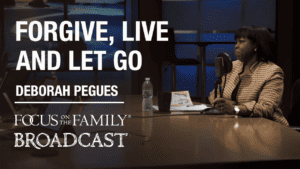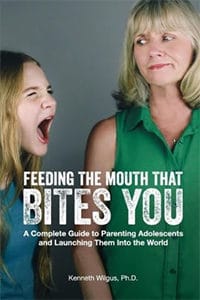Preview:
Man #1: So I knew I was grown-up the day that I was taller than my mother and I could be calm in an argument with her while she was kinda all over the map.
Man #2: I knew I was grown-up when I had to pay for my own food on family vacation.
Man #3: When I moved out of state and I didn’t have a security blanket anymore.
Woman #1: The day we signed the papers for our first house.
Woman #2: I knew I was a grown-up when I had to start buying my own groceries.
Woman #3: When I was proposed to by my husband.
Woman #4: When I moved out of my parents’ house.
Man #4: I’ll never forget the day I got my driver’s license. I felt an incredible sense of freedom and independence.
End of Preview
John Fuller: Well, I wonder when you first felt like you’re all grown up. Uh, we’ve all experienced certain situations or rite of passage moments where we realize, “I’m part of the adult world.” But what-
Jim: (laughs)
John: … about your kids? Do they know what being a grown-up is? And as a parent, are you intentionally getting them ready for adulthood? These are important questions that we’re gonna be talking about today on Focus on the Family. Your host is Focus president and author Jim Daly, and I’m John Fuller.
Jim Daly: The transition from childhood to adulthood can be one the more challenging stages that families will experience. It’s almost like we can look back and go, “I knew exactly where I was when I felt like the adult.” Or with your kids, “I knew exactly when they felt like an adult,” right? Uh, as your kids enter the teen years, attention begins to build. They want more independence but you still want them to follow the rules and, uh, keep up with the things like homework and chores and stuff like that. Did you have that experience?
John: Oh, yes, yes.
Jim: Oh my goodness, did we go… We got stir-crazy. “Is your homework done?” “I got an A on the test, Dad. Isn’t that enough?” (laughs) Where your teen, uh, may start pulling away and that’s a good thing to a degree because they need to establish their own identity and beliefs and certainly faith apart from yours. Uh, but that process can be hard to go through. And to be honest, some families navigate this transition better than others and it’s not uncommon for parents and teens to kinda battle over the expectations and control at that point. Here’s the thing. How you manage those battles will shape the relationship with your child in the years to come. So today on Focus on the Family, we want to give you some great tools that will help you and your team begin to work through the transition into adulthood in healthy and effective ways.
John: Yeah, we’re featuring a conversation with Dr. Ken Wilgus. Uh, he’s a psychologist, author, speaker, and podcast host, and he’s written, uh, a really intriguing helpful book. It’s called Feeding the Mouth That Bites You: A Complete Guide to Parenting Adolescents and Launching Them into the World. Learn more about the book and other parenting help at focusonthefamily.com/broadcast, or give us a call, 800, the letter A and the word FAMILY. And Jim, here’s how you began the conversation with our guest on Focus on the Family.
Jim: Dr. Wilgus, welcome to Focus.
Dr. Ken Wilgus: Thanks. It’s great to be here.
Jim: Now, I’m gonna call you Ken.
Dr. Wilgus: That’d be great. Yeah.
Jim: (laughs) But I love it. Okay, the first question has to be where’d you get Feeding the Mouth That Bites You?
Dr. Wilgus: Okay, that comes from a quote by an author named Peter De Vries who, in one of his books, says, “Sometimes parenting is nothing more than feeding the mouth that bites you.”
Jim: (laughs)
Dr. Wilgus: And it- it has, uh, been a title of a seminar for 25 years. And it’s the statement that parents of teenagers completely resonate with. They totally know that feeling.
Jim: It’s so true, (laughs) isn’t it? And it can change from day to day. I mean, some days it’s great. And you and your spouse usually talk about that. “Oh, I had a great discussion with our teenager today.”
Dr. Wilgus: Right.
Jim: “He actually said something other than, ‘Mmm, yeah, uh,’” right?
Dr. Wilgus: Right, absolutely. When they’re little, you know, they follow us around. But-
Jim: Oh, and talk, talk, talk.
Dr. Wilgus: … by adolescence, we’re become like groupies, and they’re the rock stars. And we’re like, “Do you wanna- do you wanna talk? We got time.”
Jim: (laughs)
Dr. Wilgus: And, “No, I got to go.”
Jim: Okay, so you believe parents have confusing relationship with their teens today. Why is that? Why are we confused?
Dr. Wilgus: Well, you know, what’s really interesting is I remember, it probably was the first class I took in adolescent psychology. And that’s where they first announced that, well, as you know, adolescents, as we understand them, that concept is about 100 years old. And the term adolescent, uh, or teenager was first used in about 1941. Now, that was a very weird experience for me. That’s like going to study to be an ear, nose and throat specialist and finding out the first day that, you know, a hundred years ago, no one had noses, and we didn’t use the word nose till after about World War II. You’re like, “Wh- what are we talking about?”
Jim: Yeah, that’s really recent.
Dr. Wilgus: Well, it is. It’s a post-industrial revolution creation, whereas basically, it comes down to that we’re a culture that, for three or four generations has forgotten the reality that childhood comes to a natural end by about the age of 13. And then after that, parenting is what I call parenting adults-in-training, which is preparing for that release. And as you know, we’re not doing a great job. I think it was around after World War II that we finally made the mistake of snapping adolescence on the end of childhood, rather than where it should be which is at the beginning of adulthood.
Jim: Well, it is amazing. Let’s sit for a moment on this idea of parents not launching well. What do you mean by that? And how, you know, what are some ways that we launch better as-
Dr. Wilgus: Well, you end up with a-
Jim: … parents of teens?
Dr. Wilgus: Yeah, well, you end up with a weird concept that now that it’s been going on the things that I’m teaching parents, their parents didn’t really do this, and their grandparents didn’t really do that. There wasn’t a lot of talk. Uh, there was, you know, more privilege. “We’ll let you take the car. We’ll let you stay out later.” But the idea of the real, uh, nuts and bolts of hearing, “Listen son or sweetheart, that’s no longer up to us, you need to answer that question for yourself,” that’s, like, rarely talked about. But it is, traditionally, always been the case. It’s within the last hundred years that we’ve forgotten how to do that. So parents now don’t really know… They think they’re being traditional by hanging on as long as possible. Sometimes they even think they’re being Christian by hanging on as long as possible. But that’s actually newfound. That’s not actually ancient.
Jim: So the industrial revolution and all the modernity has brought with it, um, how do we dial back as parents? Give me some practical examples of where I need to dial back maybe.
Dr. Wilgus: Well, probably the biggest difference is that, you know, there were cultures in the past where by about 13 or 14, you’re kinda ready to get going, the culture, agricultural-
Jim: 13, 14?
Dr. Wilgus: Yes.
Jim: That’s a key thing-
Dr. Wilgus: For example-
Jim: … to hear. (laughs)
Dr. Wilgus: … in Romeo and Juliet, that’s a story of a 13-year-old girl and a 14-year-old boy. They’re old enough to run off and get married and to be held accountable for murder-
John: That one didn’t-
Dr. Wilgus: … all that.
John: … end so well-
Dr. Wilgus: No, it didn’t.
John: … if I recall. (laughing)
Dr. Wilgus: And that’s what we’re trying to avoid in this time.
Jim: Well, that’s true.
Dr. Wilgus: But- but in our mo- modern time, our 13, 14-year-olds are not ready, really, to live on their own. So what’s missing there is this period of essentially training. And that, in the 18th century, was done with apprenticeships and so forth. But we’ve started trying to basically continue on parenting childhood right on through to 18, 20. You might have read the recent story of a man in New York who’s 30, whose parents were suing to get him-
Jim: Oh-
Dr. Wilgus: … out of the house.
Jim: … yes, yeah.
Dr. Wilgus: And you just think, what are we doing here?
Jim: Yeah.
Dr. Wilgus: So the parents haven’t experienced this either. And so it seems odd to be really releasing and sometimes scary.
Jim: Well, and speak to that dynamic of being a willing parent, to say, “Okay, at 13, I’m gonna give you more decision-making capacity.”
Dr. Wilgus: I think one of the basics that it comes down to is fear. And this is, of course, important since the vast majority of parents that I work with are Christian parents. And I don’t think there’s any command given more common throughout Scripture than “Fear not.” And so, um, it actually feels like I’m doing the right thing, I’m more, um, involved, I’m more, uh, knowledgeable parent. When, in fact, what you have is a fearful parent that just, uh, control comes from fear. And over-control comes from, uh, almost irrational fear. So things like letting go of lesser things can seem like I’m not doing my job and I need to do what’s right. And too often, you end up just kinda looking silly, you know, like parents that tell a 17-year-old, “You’re not allowed to listen to anything but Christian music.” Unless you’re Amish, you are kidding yourself because there are devices that they are listening to whatever they wanna listen to.
Jim: Well, and that’s, we wanna get into that, uh, today and next time because there are things that you’re fooling yourself.
Dr. Wilgus: Yeah.
Jim: And we’re gonna to identify that. Now, some people, there’s gonna be a variety of parenting application here.
Dr. Wilgus: Mm-hmm.
Jim: Uh, some households will be okay in that regard, but for the 80%, it’s gonna be different. And-
Dr. Wilgus: Well, there’s usually different reactions. A number of people read the book and say, “Okay, I hadn’t said it the way you said it, but that’s kinda what we’re doing.” And-
Jim: Right.
Dr. Wilgus: … it’s encouraging to know is that the main line.
Jim: Yeah.
Dr. Wilgus: And then some, however, are kinda stunned by the whole thing.
Jim: That’s true. Let me go back to something that I think may be the question of the program, if I could be that bold, um, because I experience it too, uh, that parental fear. Now, you say some of the most fearful parents you know are actually devout Christians. Why is there this connection between the devout Christian parent and this fear and control in the child-rearing experience? Why this dichotomy?
Dr. Wilgus: I think part of it is that, you know, the Christian parents that I work with are very involved with their children. And so I don’t have to do a lot of reminding these parents to be involved. So that ditch, they’re not gonna go off into of the kind of ignoring their children. But there’s a ditch on the other side of the road, which is “I’m over-controlling, trying too hard.” So part of it is compassion and real involvement. That’s a good thing. But the other part is failure to recognize that parenting teenagers is also part of our own sanctification. It’s a spiritual process of learning to really… We say that we know God’s loving power over us, but there’s nothing scarier than saying, “Okay, here’s the car, and we’ll see you in a few hours,” and- and-
Jim: (laughs)
Dr. Wilgus: … actually believe that that’s actually gonna happen.
Jim: I love that moment when Trent got his license, and we got home from the DMV, and he came in the house with me. And we sat around for a minute. I said, “You gonna go anywhere?”
Dr. Wilgus: (laughs)
Jim: He goes, “Can I?” I said, “Yeah, just go.” He goes, “How long should I go for?” I said, “I don’t care. Just go.”
(laughing) And it was like, it was like, you know, kicking him out of the nest a little bit.
Dr. Wilgus: That wasn’t his mother saying that.
Jim: He just-
Dr. Wilgus: That was you.
Jim: Yeah. He just-
Dr. Wilgus: Yeah, yeah, yeah.
Jim: Yeah, it wasn’t his mother.
(laughing)
John: Where was Jean?
Jim: She was hitting me in the ribs.
John: Yeah.
Jim: If he wants to stay-”
Dr. Wilgus: “Are you crazy?”
Jim: … “at home, let him stay at home. What’s wrong with that?”
Dr. Wilgus: Yeah, yeah, yeah.
Jim: But it was kind of that, you know?
Dr. Wilgus: That’s- that’s good.
Jim: And he just drove around the neighborhood for-
Dr. Wilgus: Sure.
Jim: … like, 20 minutes.
Dr. Wilgus: Sure.
Jim: But it’s that first breath of independence, right?
Dr. Wilgus: Yeah.
Jim: It’s that-
Dr. Wilgus: Absolutely.
Jim: … first experience that, “I don’t have to have mom or dad sitting in the car with me. This is a weird feeling.”
Dr. Wilgus: And it’s a good thing.
Jim: It’s a good thing. But we do struggle with it. If I were to take a self-assessment that you have not created, nor has Focus on the Family. (laughs)
John: But we should.
Jim: But we should. What would be one or two questions, as a parent, that would indicate that I’m over-controlling here, that this is an area of fear for me, that I’m not capable of letting them own some things?
Dr. Wilgus: Well, the first would have to be what I call the big question, which all parents really need to take some time to think about, which is when will you, as a parent, say that your child is completely an adult? When-
Jim: (laughs)
Dr. Wilgus: … will you say they are completely ready for that?
Jim: So never is not a good answer? (laughs)
Dr. Wilgus: It’s not… You can answer that, but you get 10 points off.
John: Yeah, yeah.
Jim: You get 10 points off.
Dr. Wilgus: It’s-
Jim: But that’s really the feeling of it, right?
Dr. Wilgus: … just really thinking about when are you gonna be done is worth thinking about because a number of parents have never really thought that through.
Jim: Yeah.
Dr. Wilgus: So that would be number one. Number two would probably be when did you, as a- an adult, know that you were an adult? And how did you know that? So a certain amount-
Jim: Yeah.
Dr. Wilgus: … of self-assessment. And then number three would be what steps have you planned to take to get from here to the end of parenting? And that’s basically the outline of- of how to feed the mouth that bites you.
Jim: And that’s what’s great, yeah, Feeding the Mouth That Bites You. You cover all that material. God created teenagers, at least I think so.
Dr. Wilgus: I’ve heard different-
Jim: I think so. (laughs)
Dr. Wilgus: … but I think you’re right.
Jim: But how, what is his, uh, expectation of a teenager?
Dr. Wilgus: I think his expectation for teenagers is way higher than parents often think. I really do think God sees them-
Jim: In what way?
Dr. Wilgus: Um, for one thing, they’ve reached formal operational thought. And, uh, it’s really important that teenagers really start to think about their relationship with God separate from what their parents say. And so it’s essential that we need to know that God is speaking to them, God is expecting them to respond and simply kind of being passive participants in what our family does was fine when you’re 8, but not when you’re 16, 15. I think God expects teenage to really begin to wrestle with the hard question, and they do, the hard questions of faith.
John: Huh. How much of that Ken, uh, that fear that Jim asked about earlier, how much of what you just described is part of the fear, my child is going to struggle and wrestle, and they may not come up with the same answers that I did-
Dr. Wilgus: That’s-
John: … or that I want them to?
Dr. Wilgus: That’s absolutely… and it’s critical because, depending upon what research you look at, 60 to 80% of high school-involved active Christian teenagers will completely drop off the spiritual map when they leave home. And so it’s essential that parents really start early; 13, 14, saying, “Hey, I really liked the sermon this morning. But what did you think? Do you agree with that stuff? What are you…”, to actually signal that, as parents, we get it, that we can’t make you think the same way we do.
John: And there is some research that shows that, a lot of times, those kids who walk away from the faith or go kind of dark on their faith do come back.
Dr. Wilgus: About a third of them will come back.
John: Yeah.
Dr. Wilgus: But it’s still not a great, uh, percentage. We’re looking to increase that. And I think that respecting a teenager’s ability to make those decisions is a critical factor to keep them in the faith.
John: Yeah. Uh, Ken Wilgus is our guest on Focus on the Family, and we’re talking about launching your teens, giving them the freedom to become adults. And in a few minutes, we’ll respond to some questions from our live audience. If you’d like to know more about Dr. Wilgus and his book, Feeding the Mouth That Bites You, visit focusonthefamily.com/broadcast.
Jim: Ken, speak to the idea of planned emancipation, which is really the theme of Feeding the Mouth That Bites You, how you can help plan the emancipation of your teenager?
Dr. Wilgus: Yeah.
Jim: What’s that general-
Dr. Wilgus: You could-
Jim: Yeah.
Dr. Wilgus: You could practically title the book Planned Emancipation, really. That’s really what it’s about, which is, um, getting ahead of the curve, knowing that by 13, your teenager, uh, needs and needs to need to be out on their own eventually. So you get out ahead of it. And in an orderly, rational fashion, you give over that freedom, uh, in reasonable stages. Now, with freedom always comes responsibility. So by letting go of one thing, you also leave them to their own consequences of the things that they’re, uh, doing. My favorite is always the- the easy one is music, that you can give a teenager, um, “You now have the freedom. It’s up to you to make your own decision about music. What you listen to, that’s between you and God. However, if your little sister is caught on your phone listening to some of that stuff, then you’re gonna lose your phone for a day. You need to make sure… That’s just true of any adult, you have to be held responsible for your own behavior.” So, um, freedom carries responsibility with it. And then this is to your point, by letting go of that, it should allow and does allow for what often never happens, which is the parent really being able to say, “Can I look at your playlist? Do you mind if I just ask you about… Doesn’t this bug you on a Sunday morning, listening? And, again, it’s not… I’m not telling you, ‘You can’t.’ But can we talk about that?”
Jim: Huh.
Dr. Wilgus: And really have some substantive-
Jim: And in that context-
Dr. Wilgus: … discussions.
Jim: … you’re saying you get more opportunity, more open heart-
Dr. Wilgus: Absolutely.
Jim: … from your teenager if they want to-
Dr. Wilgus: If they believe you, if they believe you-
Jim: Yeah.
Dr. Wilgus: … really aren’t gonna step back and go-
Jim: Right, and you’ve-
Dr. Wilgus: … “Okay, this is bad.”
Jim: …demonstrated that you’ve let them have some-
Dr. Wilgus: That’s right.
Jim: … decision-making authority. Let’s further, uh, illuminate that emancipation idea. You have a, I think you call it the word picture of how planned emancipation works. It’s kind of a country with different states. Describe it.
Dr. Wilgus: Well, just picture a map basically with a large sort of continent divided into states. And this is the, uh, sovereign nation of your kid, Brandon, you know, whoever. And it’s divided into these discrete areas that are… might be school, uh, clothing, money, uh, different aspects of that that require control. And you start looking at that by… What teenagers look at is, um, “How much of my territory is occupied by your armies?”
Jim: (laughs)
Dr. Wilgus: And your troops are on my stuff. That’s why te-
Jim: This is good.
Dr. Wilgus: That’s why kids and teenagers are really bothered by, um, you know, like, a teenager, parents are always stunned by, “Dr. Wilgus, we asked him, do you have homework? And he said no. But guess what? He did.”
Jim: He did.
Dr. Wilgus: As if, you know, that’s a big stunner. They-
Jim: That’s never happened in my house.
Dr. Wilgus: Yeah, which is great. (laughing) I think that’s great. But for the rest of us-
Jim: So you’re saying that’s the wrong question?
Dr. Wilgus: They don’t even care… They- they’re not even, they don’t even feel guilty. It’s more like you shouldn’t be in this territory in the first place.
Jim: Huh.
Dr. Wilgus: And I don’t actually feel bad about… Basically, that’s passive, uh, resistance to this occupying army-
Jim: (laughs)
Dr. Wilgus: … which is you shouldn’t be looking at my school stuff anyway.
Jim: That is really funny.
John: I can do it.
Dr. Wilgus: So you wanna make your way out of those territories.
John: That’s kinda their statement of “I can do this.”
Dr. Wilgus: Even if, even if they’re failing something-
John: Well, that’s the question, Ken.
Dr. Wilgus: … it doesn’t mean “I need your help.”
John: So if a lot of parents are saying, yeah, well, school, guess what?
Dr. Wilgus: That’s how important the autonomy need is. You know, when you try to talk what parents would think reasonably, “Honey, you’re failing algebra, so we’re going to step in, okay?” You don’t get a teenager that goes “Okay.” She may have to, may not have a better answer. She still doesn’t like it-
John: Should we step in?
Dr. Wilgus: … because, you know, the question there has more to do with, uh, the details of how you set up, um, what kind of freedom you’re giving. And that’s all laid out in the book. You can start by backing away from micromanaging, but you still have to maintain minimum grades. You can do it different ways that, again, I think parents do a better job of rationally stepping out in reasonable chunks rather than this, “Fine, you do it yourself, pass or fail.” You don’t have to go that far.
Jim: All right, the young adults have been sitting here listening to this. Let’s tap them to ask you some questions that we haven’t covered yet.
Dr. Wilgus: That’d be great.
Jim: So are we ready for that, everybody? All right, we’ve got one. Come on up.
John: Hello, I’m John. I’m from South Dakota. And listening to Dr. Ken’s little spiel here, you had talked about, uh, the different states, um, and how parents can invade different states of our being, I guess. And you talked about the financial state. And I have a friend in college who has been given freedom in the fact that his parents are paying for his college, but his parents don’t know where to cut the financial security. As in, where do you cut the gas? Where do you cut food? Where do you cut living? So I just wanted you to speak to maybe just content of financially, where do you cut your child loose to launch him successfully?
Dr. Wilgus: Now that’s a great question because what ends up happening is that when we talk about the freedoms, sometimes it sounds like I’m advocating just letting everything go. But when it comes to, uh, post, uh, high school support, when it comes to limit-setting, I think parents need be pretty clear. For example, it’s not terribly good for most students to be given enough money that you don’t have to work at all, and you have plenty of extra money. It actually is good for most college students to need about 10 to 15 hours’ worth of work to fill in the gap for their expenses, uh, at the minimum. So, um, that kind of, um, help is really better if you don’t overdo it. And then, secondly, I think it’s most important that parents be real clear, “This is what we’re providing.” As I call it, uh, when you send a kid to college, you’re… most parents become a benevolent bank. It’s like, you know, “Under these circumstances, we will pay for this amount.” And be real clear about it-
Jim: Yeah.
Dr. Wilgus: … uh, so that a college kid can really know this is what I can count on, and this is what I have to figure out for myself.
John: Sure.
Dr. Wilgus: So if that’s what you’re talking about, I think clarity is really important-
John: Yeah.
Dr. Wilgus: … and making sure, frankly, that it’s not too much.
Jim: Ken, sometimes that plan, it just needs to be talked through.
Dr. Wilgus: Right.
Jim: And it’s not lack of desire.
Dr. Wilgus: Right.
Jim: It’s, I think, just ignorance. I just-
Dr. Wilgus: We weren’t great-
Jim: … hadn’t thought about it.
Dr. Wilgus: … with the money part ourselves.
Jim: Right.
Dr. Wilgus: I mean, just, we get kind of tongue-tied when it comes to talking about it.
Jim: But here’s what you need to be thinking about.
Dr. Wilgus: That’s right. That’s right.
Jim: What we’ll cover in college or whatever you’re gonna do, and what we- where we’re gonna cut you off.
Dr. Wilgus: That’s right.
Jim: And we’ve done a little bit of that with, uh, you know, teenage gas, allowance and that kind of thing for school. We cover school gas, but that’s it, ’cause we live about 20 miles from school. (laughs) So-
Dr. Wilgus: That is a big deal.
Jim: … that’s a, that creates a little bit of a burden for them, so we cover that amount. But all his joyriding, that’s gotta come from a different pocket.
Dr. Wilgus: Do they still joyride? Is that-
Jim: I don’t know.
Dr. Wilgus: … even a thing? I don’t know.
(laughing)
But-
John: I would if gas was unlimited.
(laughing)
Jim: There you go. He’d be joyriding coast to coast.
John: I mean, that was, that was one of the big things for me, like, getting to college and having gas be on my own. It was like, well, I can’t just take a six-hour drive to Kansas City-
Dr. Wilgus: That’s right.
John: … and catch a football game. You know, like, that’s coming out of my own pocket. So that was-
Jim: Changes your decisions?
John: Yeah, yeah.
Dr. Wilgus: It really does.
John: It really does.
Dr. Wilgus: It really does.
John: And I think it’s a great step of, you know, independence, just, like you said, have the conversation to bring clarity to the topic of, you know, we’re gonna, we’re gonna provide for you here and here but not here. And, uh-
Dr. Wilgus: Which is respectful.
John: Yeah.
Dr. Wilgus: It’s just being respectful that, “Dude, that’s now up to you…”
John: Sure.
Dr. Wilgus: … “after that.”
Jim: I like that.
Dr. Wilgus: It’s not being mean. It’s just that’s your due.
Jim: All right.
Erica: Um, hi, I’m Erica. I’m from Indiana. Um, and I really enjoyed hearing you speak about the practical ways of launching, um, and of being launched. I was wondering if you could speak to how to redefine that emotional relationship as, you know, we’re growing up and learning how to have an adult relationship with our parents and how much we share and how much communication goes on there?
Dr. Wilgus: That is a really good question, probably because you’re fairly close to at least one of your parents. Um, it actually can be a problem, in a way, if you’re really close to one of your parents, to shift into a point where, uh, how do we be close as adults rather than what we used to? For example, believe it or not, part of being a close, good child is you get that gut feeling that, “If something’s gone wrong, if I can just go talk to mom or dad, it’ll be okay.” Well, that’s actually not so true in adolescence. They… First of all, you know what they’re gonna say in most of what you tell them. And secondly, they don’t give you anything more. It’s almost irritating, like, “Yeah, I already know that. Do you have anything new for me?” And they’re like, “No, I don’t have anything.” So you, it’s a matter of not so much pulling away but changing some of those boundaries as to what are we expecting from each other. And, again, if you’ve been really close, that can be a real problem. Some of the most intense arguments I’ve had in families start with that recognition that, “I don’t think we can get each other to agree on this anymore.” And that’s scary for both people where we used to be able to talk things through and kinda have an agreement. It’s a normal thing to have to learn to agree to disagree, which is probably the most practical thing I would suggest, is learning how to say, “Well, I don’t think we’re on the same page with this and I don’t think I need to hammer you into it and I’d rather you not hammer me into it. Let’s just let that go.” But that’s hard to do.
Erica: Hmm.
Jim: Hmm. Do we have another question?
Alante: Um, Dr. Ken, thank you. A lot of that was really cool to hear. Uh, my name’s Alante. I’m from Louisiana. Uh, what do you think about home-school parents who own a lot of those territories that kids interact with every day?
Dr. Wilgus: That’s a really good question. Uh, I think it’s particularly a challenge for home-school parents because sometimes home-school kids don’t push as hard. And, uh, sometimes, uh, parents can feel tempted to think, “Well, maybe I have a teenager that isn’t gonna be needing that independence thing,” which is a mistake. You really have to press that. So I think it’s especially important that, uh, home-school parents, uh, really initiate the conversation, uh, and sometimes even saying, “Hey, you know, you don’t really need to ask us that. That’s up to you now,” which is weird and stunning for teenagers to hear from a parent. Uh, so I think it’s particularly a challenge because sometimes with the home-school parents, they can actually hold on longer, uh, than they really should without as much pushback. And that’s not as, uh, much a blessing as it seems.
Jim: Ken, how does that conversation go between husband and wife? (laughs)
Dr. Wilgus: Uh, that’s an-
Jim: I think when you-
Dr. Wilgus: … interesting question.
Jim: … start saying, “Okay, if we’re gonna be intentional about emancipating our home-schooled 17-year-old or 15-year-old, these are the things we’re gonna need to do.” I- I know you outline it in the book. And it’s applicable to home school, public school, Christian school, doesn’t matter. But I would say you’re right, the home-school environment, the parents are gonna to need… Culture’s not gonna force that as much.
Dr. Wilgus: That’s right.
Jim: They might-
Dr. Wilgus: That culture won’t.
Jim: Yeah.
Dr. Wilgus: And even well-meaning part of that culture may even push back. And so I think, very often, between a mother and a father, uh, it’s very common that Feeding the Mouth That Bites You principles kind of makes sense to dads. It’s not, it… I can’t tell you how many times I’m sitting in my office with a mom, who has pretty much run the parenting show for 13, 14 years. And silent Dad, I’m in the midst of explaining, and he goes, “Well, Honey, what he’s saying is…” And she looks at him like, “Who are you to all of a sudden start…” You know-
Jim: The teen lawyer. (laughs)
Dr. Wilgus: … but he kind of gets it. Yeah, yeah. So it’s really important that he be supportive-
Jim: Yeah.
Dr. Wilgus: … of the fact that planned emancipation can feel wrong. It feels unloving to nurturing moms to step back and let go. And so she has a serious pushback, and it’s not good enough for him to simply yell, “Well, that’s what the doctor said.” Uh, what’s usually involved is lots of, uh, dinners, lots of romantic times to remind her, “Lis- listen, once these kids are gone, it’s back to the- the good stuff before we got into all this mess.”
(laughing)
And encourage her that we’ve got a future. So it’s a very important conversation-
Jim: Yeah.
Dr. Wilgus: … that happens, you’re right.
Jim: Mm-hmm.
Dr. Wilgus: That’s a great question.
Alante: Thank you.
Jim: All right, Dr. Ken, this has been a great discussion. We have more next time. Uh, we wanna hold you over and continue for day two. And, uh, I think every parent should get a copy of your book, Feeding the Mouth That Bites You, um, because I- I resonate with the message, if I could be that blunt. I think you’re on it biblically in every way. I think, uh, we really hurt and harm our teenagers by keeping them in this perpetual adolescence and let us make all the decisions ’cause we’re older and wiser, just doesn’t work. Um, this book, Feeding the Mouth That Bites You, is one of those wonderful resources. Thank you for being with us on Focus on the Family.
Dr. Wilgus: Great to be here. Thank you.
John: Well, do make plans to join us next time. And meanwhile, if you want to get a copy of Dr. Wilgus’s book, just make a monthly pledge of any amount or a one-time gift to Focus on the Family today and we’ll send that out to you. Uh, that’ll be our way of saying thank you for, uh, partnering with us to equip parents and to strengthen families like yours as I hope we’ve done today. The number to call is 800, the letter A, and the word FAMILY. 800-232-6459. Or you can donate and get the book at focusonthefamily.com/broadcast.
Jim: And John, I wanna take a moment just to remind our listeners why a monthly pledge is so valuable to the work we’re doing here to help families. Every year Focus on the Family is contacted by literally hundreds of thousands of people which is great. They’re looking for resources and practical help for issues in their marriage, parenting, or in their faith journey. About 2,000 a month, they’re gonna tap our counseling staff to get deeper insights that they need at that moment. Your ongoing support allows us to respond to all these needs and produce the radio programs and podcasts like this one, and provide those free counseling services and so much more.
John: Yeah, and this is such a terrific ministry, Jim, that you and I are not only in police, we’re donors as well.
Jim: (laughs) There you go. We believe in it.
John: We donate monthly and you do too.
Jim: That’s right. And if a monthly pledge is more than you can afford, we get it. A one-time gift will also help. Let’s work together. That’s the bottom line to share the gospel and strengthen families today.
John: Donate today at focusonthefamily.com/broadcast, or when you call 800, the letter A and the word FAMILY. We’ll hear more from Dr. Wilgus next time about planned emancipation and why teens are desperate to grow up. And for now, on behalf of Jim Daly and the entire team, thanks for listening to Focus on the Family. I’m John Fuller inviting you back next time as we once again help you and your family thrive in Christ.






















